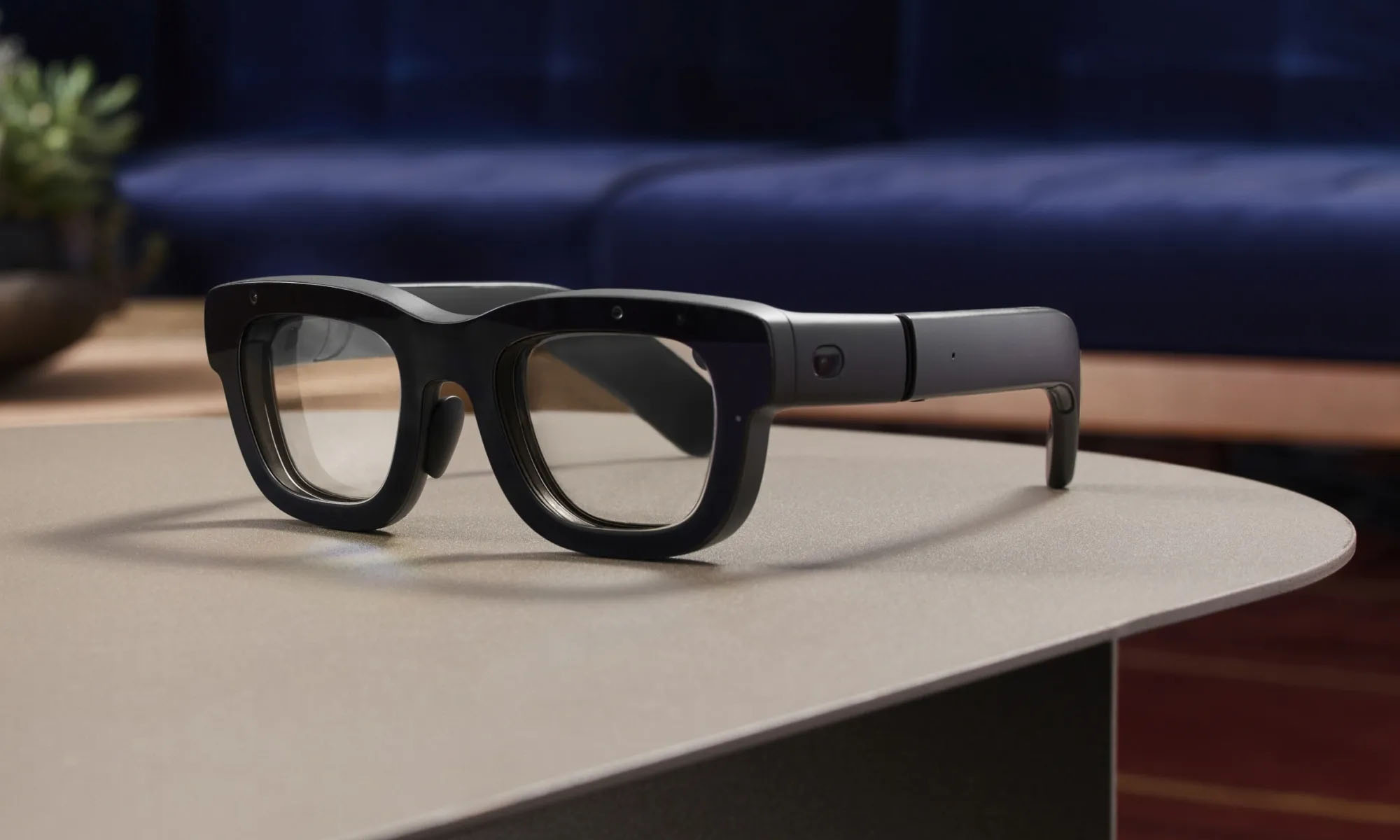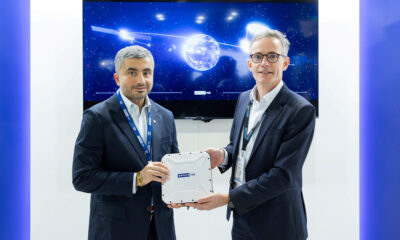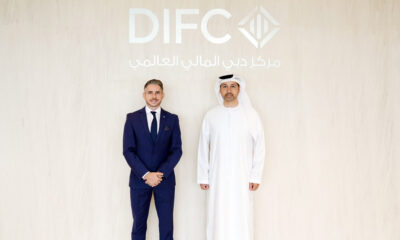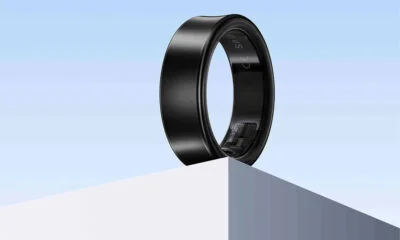News
Meta Reveals Orion AR Glasses, Offering A Glimpse Into The Future
The prototype was showcased at the Connect conference, bringing the company’s vision of blending virtual and physical worlds closer to reality.

Meta, the parent company of Facebook, has unveiled a working prototype of its augmented-reality glasses — named Orion — at its annual Connect conference. At the event, CEO Mark Zuckerberg outlined his vision to use the AR device to blend the real world with the virtual:
“This is the physical world with holograms overlaid on it,” Zuckerberg said as he slid the glasses from their metal case. Describing Orion as “a time machine” he added, “These glasses exist, they are awesome, and they are a glimpse of a future that I think is going to be pretty exciting”.
The Orion AR glasses are built from magnesium alloy and run on custom silicon chips developed by Meta. They offer users control via hand-tracking, voice commands, and a wrist-based neural interface. Zuckerberg said Meta plans to further refine the glasses, making them smaller, more affordable, and ready for mass production in the near future.
So far, sources have revealed that Meta aims to release its first consumer version of the Orion AR glasses by 2027, once the technology has become more cost-effective.
Also Read: Bybit Launches Islamic Account, Enabling Shariah-Compliant Trading
In addition to Orion, Meta introduced a more modest mixed-reality headset called the Quest 3S, with a starting price of $300. The company also rolled out several new AI tools, including chatbot updates and the ability for Meta AI to auto-insert personalized images into Facebook and Instagram feeds. An audio upgrade also allows users to choose celebrity voices, like Judi Dench or John Cena, for the Meta AI assistant. “I think voice is going to be a way more natural way of interacting with AI than text,” Zuckerberg said.
Finally, Meta has introduced three new versions of its Llama 3 AI models. The company continues to invest billions in AI and metaverse technologies, pushing its capital expenditure forecast for 2024 to a record $37-40 billion.
News
Alienware Just Announced Six New Gaming Monitors
The new models include three QD-OLED and three budget-friendly QHD options, expanding the company’s lineup for all gamers.

Alienware has just updated its gaming monitor lineup with six new additions, including the highly anticipated Alienware 27 4K QD-OLED Monitor. The latest wave of releases is set to reach more gamers than ever, offering high-end QD-OLED displays alongside more budget-friendly options.
The latest displays clearly show that the company is doubling down on QD-OLED with three new models sporting the technology. A redesigned Alienware 34 Ultra-Wide QD-OLED Monitor is also making a return, further refining what is already a fan-favorite display.
A Unified Design: The AW30 Aesthetic
All six monitors feature Alienware’s new AW30 design language, first introduced at CES. The AW30 aesthetic brings a futuristic, minimalist look that unites the entire lineup under a cohesive visual identity.
Pushing QD-OLED Even Further
The refreshed Alienware 34 Ultra-Wide QD-OLED Monitor (AW3425DW) builds on its predecessor’s success with a 240Hz refresh rate (up from 175Hz) and HDMI 2.1 FRL support. It also gains G-SYNC Compatible certification alongside AMD FreeSync Premium Pro and VESA AdaptiveSync, ensuring ultra-smooth performance. With a WQHD (3440×1440) resolution and an 1800R curve, this display enhances immersion for both gaming and cinematic experiences.
For those who crave speed, the Alienware 27 280Hz QD-OLED Monitor (AW2725D) pairs a high refresh rate with QHD resolution, balancing sharp visuals with ultra-smooth gameplay. Meanwhile, the Alienware 27 4K QD-OLED Monitor (AW2725Q) delivers stunning clarity with an industry-leading pixel density of 166 PPI, making it the sharpest OLED or QD-OLED monitor available.
Also Read: Infinite Reality Acquires Napster In $207 Million Deal
Worried about OLED burn-in? Alienware’s entire QD-OLED lineup comes with a three-year limited warranty covering burn-in concerns, offering peace of mind for gamers investing in these high-end displays.
Bringing QHD To A Wider Audience
Alongside QD-OLED, Alienware is also releasing three new QHD gaming monitors aimed at more price-conscious gamers. The Alienware 34 Gaming Monitor (AW3425DWM), Alienware 32 Gaming Monitor (AW3225DM), and Alienware 27 Gaming Monitor (AW2725DM) provide a range of sizes and formats to suit different preferences:
- The Alienware 34 Gaming Monitor (AW3425DWM): An ultrawide (WQHD) option for a panoramic, immersive experience.
- The Alienware 32 Gaming Monitor (AW3225DM): A standard 16:9 panel for a traditional but expansive desktop setup.
- The Alienware 27 Gaming Monitor (AW2725DM): A 27” display offering the same performance in a more compact form factor.
All three gaming monitors feature a fast 180 Hz refresh rate, a 1ms gray-to-gray response time, and support for NVIDIA G-SYNC, AMD FreeSync, and VESA AdaptiveSync to eliminate screen tearing. Additionally, with 95% DCI-P3 color coverage and VESA DisplayHDR400 certification, these displays deliver vibrant colors and high dynamic range for lifelike visuals.
-

 News3 weeks ago
News3 weeks agoSpace42 & Cobham Satcom Launch New Satellite Broadband Terminal
-

 News3 weeks ago
News3 weeks agoRipple Gains DFSA License To Offer Crypto Payments In Dubai
-

 News2 weeks ago
News2 weeks agoAre You Ready For Hong Kong’s InnoEX & Electronics Fair?
-

 News2 weeks ago
News2 weeks agoWizz Air Abu Dhabi Adds Beirut Flights Amid Tourism Revival



















